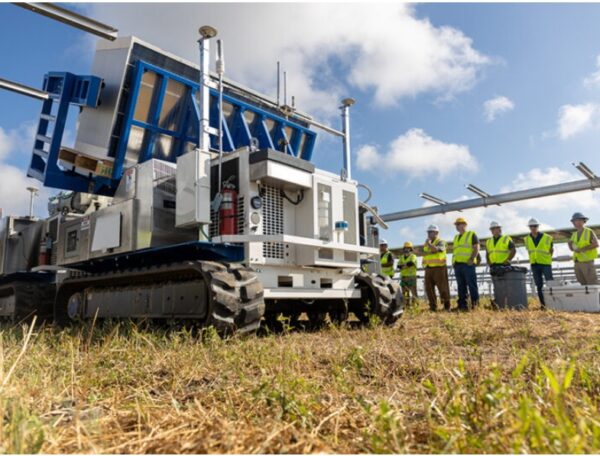From pv magazine USA
Rosendin, an electrical contracting company, announced that its Renewable Energy Group (RREG) will demonstrate its new autonomous robotic solution for solar module installation on April 17 in West Texas.
The three-piece robotic system reportedly can install solar modules three times faster than its human counterparts, while also enhancing worker safety and addressing the industry’s persistent labor shortage.
The labor shortage is more critical than ever as energy installations increase to try to meet the incredible rising load demand caused by the proliferation of data centers and electrification. In a recent webinar conducted by the National Electrical Manufacturers Association (NEMA), Rich Stinson, president and CEO of Southwire, a Chicago-based wire and cable manufacturer, identified the labor shortage as one of the “chokepoints” to meeting the unprecedented demand growth.
RREG operators will demonstrate lidar-based obstacle detection and avoidance, maneuverability across uneven terrain and positioning of solar modules panels Rosendin reports that using GPS and KMZ mapping, the robots can place the modules within 2 mm.
Also demonstrated will be how skilled electrical teams work alongside the robotic system to install the solar modules.
In previous field testing on a similar solar project, Rosendin said robots working with a two-man crew achieved an installation rate equaling 350 to 400 modules per eight-hour shift. Rosendin reported that this is three times the rate of a standard three- to four-person crew manually installing modules.
“We created a solution that will revolutionize the installation of renewable energy facilities worldwide by providing a safer, faster, repeatable, and more cost-effective means of deploying solar installations in remote locations,” said David Lincoln, Rosendin senior vice president. “Countless hours have been spent developing and testing the technology at utility-scale solar facilities, resulting in a robotics system that will assist electricians and reduce the risk of workforce injuries while addressing the construction industry’s decades-long workforce shortage.”
The robots were developed by Rosendin in a partnership with ULC Technologies, a New York-based developer of robotic solutions for the energy industry.

The hybrid gas- and battery-powered system includes a panel-setting robot, a tracked, construction-grade robotic platform with an integrated robotic arm, and nine-vacuum suction cups to lift and place solar modules. Two panel-carrying robots transfer pallets of solar modules between the loading area and the installation point.
The robotic machines reportedly can handle up to 100 pounds. While they’re doing the heavy lifting, human electricians focus on securing the critical grid connections.
Rosendin said that the working prototype is designed to withstand environmental elements including extreme temperatures, wind and rain, puddles and mud, and uneven and steep rocky terrain up to a 30-degree incline.
Over the past 15 years, Rosendin reported that it has delivered nearly 7 GW of solar project installations in the United States, Guam and Puerto Rico, with more than 7 GW in various stages of development and more than 2.5 GW under construction. Rosendin’s portfolio includes mid- to large-scale commercial and utility-grade solar farms, including the Aktina renewable power project in Texas, the Townsite solar-plus-storage project in Nevada, and the Athos renewable energy project in California.
Developers and business leaders are invited to witness the demonstration in West Texas.
This content is protected by copyright and may not be reused. If you want to cooperate with us and would like to reuse some of our content, please contact: editors@pv-magazine.com.









2 comments
By submitting this form you agree to pv magazine using your data for the purposes of publishing your comment.
Your personal data will only be disclosed or otherwise transmitted to third parties for the purposes of spam filtering or if this is necessary for technical maintenance of the website. Any other transfer to third parties will not take place unless this is justified on the basis of applicable data protection regulations or if pv magazine is legally obliged to do so.
You may revoke this consent at any time with effect for the future, in which case your personal data will be deleted immediately. Otherwise, your data will be deleted if pv magazine has processed your request or the purpose of data storage is fulfilled.
Further information on data privacy can be found in our Data Protection Policy.